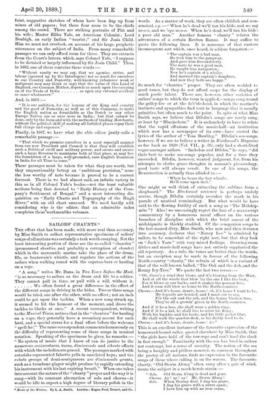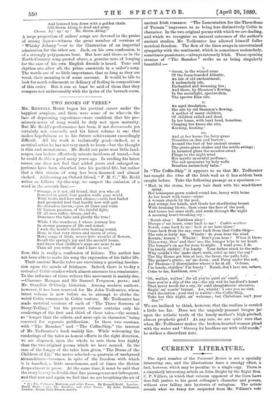SAILORS' °HAUNTS.*
THE effort that has been made, with more zeal than accuracy, by Miss Smith to collect representative specimens of sailors' songs of all nations was certainly a task worth essaying. Not the least interesting portion of these are the so-called "chanties" (pronounced shanties, and probably a corruption of chantez) which in the mercantile marine take the place of the drum, fife, or boatswain's whistle, and regulate the actions of the sailors when walking round with the capstan-bars or hauling on a rope.
"A song," writes Mr. Dana. in Two Years Before the Mast, "is as necessary to sailors as the drum and fife to a soldier. They cannot pull in time, or pull with a will, without it.
We often found a great difference in the effect of the different songs in driving in the hides. Two or three songs would be tried, one after the other, with no effect ; not an inch could be got upon the tackles. When a new song struck up, it seemed to hit the humour of the moment, and drove the tackles to blocks at once." A recent correspondent, writing to the Musical Times, notices that in the " chanties" for hauling on a rape, they generally have a secondary accent for each haul, and a special stress for a final effort before the welcome "spell-ho 1" The same correspondent comments humorously on the difficulty of representing some of these songs in musical notation. Speaking of the specimens he gives, he remarks :— "No system of music that I know of can do justice to the numerous acciaccaturas, turns, diminuendo and vibrato effects with which the melodies are graced. The passages marked with asterisks represented falsetto yells in unrelated keys ; and the rubato groups of demi-semiquavers are diminuendo grunts, such as a trombone-player might produce by rapidly extending his instrument with his last expiring breath." When one takes into account the nature of the " chanty "proper and the way it is sung—with its constant alternation of solo and chorus—it would be idle to expect a high degree of literary polish in the *Nuevo of the Waters. By L. A. Smith. London : Kagan Patti, Trench, and Co. words. As a matter of work, they are often childish and non- sensical, e.g. :—" When he's dead we'll tan his hide, and we say so-o-o, and we 'ope so-o-o. When he's dead, we'll tan his hide ; a poor old man." Another famous " chanty " relates the adventures of a certain Reuben Ranzo. It may suffice to
quote the following lines. It is nonsense of that curious inconsequent sort which, once heard, is seldom forgotten:—
" The captain was a bad man, He took him to the gangway, And gave him five-and-forty.
The mate he was a good man, He taught him navigation ; Now he's captain of a whaler, And married the captain's daughter, And now they both are happy."
So much for "chanties" proper. They are often wedded to good tunes, but they do not afford scope for the display of much poetic talent. There are, however, other varieties of sailors' songs to which the term is applied,—songs sung round the galley-fire or at the fo'c'sle-head, in which the mariner's instincts and sympathies find vent in language that is usually primitive, but often much to the point. In spite of what Miss Smith says, we believe that Dibdin's songs are rarely sung, at least by "Bluejackets." It is melancholy to have to relate that the vapid effusions of the music-hall—an institution which now has a newspaper of its own—have ousted the lyrics of the author of "Tom Bowling." Dibdin's sea-songs,
however, if we are to believe a writer in Blackwood's Magazine as far back as 1820 (Vol. VII., p. 35), only had a short-lived
vogue amongst sailors. "Incledon and Dibdin," he says, "did their best to make sea-songs popular, and for a time they succeeded. Dibdin, however, wanted judgment, for, from his attempts to clothe grave thoughts in seaman's phi aseology, good taste will always revolt. In one of his songs, the Resurrection is actually thus alluded to :-
'When he hears the last whistle, He'll come upon deck.'
One might as well think of extracting the sublime from a shopboard." The Blackwood reviewer is perhaps unduly
severe, though Dibdin certainly overshot the mark in his parade of nautical terminology. But what would he have said to the flowing futility of such a song as "The Midship- mite "? Alas ! we unceasingly regret the loss of a manuscript commentary by a humorous naval officer on the various breaches of discipline with which the brief career of the midshipmite is thickly studded. Of the companion songs to the last-named ditty, Miss Smith, who now and then deviates into accuracy, declares that "Nancy Lee" is admitted by sailors to be somewhat of the right sort, but that they look on "Jack's Yarn" with very mixed feelings. Drawing-room ditties and music-hall songs have not entirely supplanted the old repertory. As a rule, the tunes are better than the words, but an exception may be made in favour of the following North-country "chanty," the refrain of which is a variant of that of the well-known ballad, "The Oak and the Ash, and the Bonny Ivy-Tree." We quote the last two verses :—
"Oh, there's a wind that blows, and it's blowing from the West, And of all the winds that blow 'tis the one I like the best; For it blows at our backs, and it shakes the pennon free, And it soon will blow us home to the North-countree. Chorus.—And it's home, dearie, home ! oh, it's home I want to be, My topsails are hoisted, and I must out to sea,
For the oak and the ash, and the bonny birchen tree, They're all a growin' green in the North-countrce.
And if it be a lass, she shall wear a golden ring ; And if it be a lad, he shall live to serve his King ; With his buckles and his boots, and his little jacket blue, He shall walk the quarter-deck, as his daddy used to do. Chorus.—And it's home, dearie, home ! &c."
This is an excellent instance of the favourite expression of the homeward-bound sailor, quoted elsewhere by Miss Smith, that "the girls have hold of the tow-rope and can't haul the slack in fast enough." Familiarity with the sea has bred in sailors not contempt, but a sense of security. The notion of the sea being a haughty and pitiless monster, so common throughout the poetry of all nations, finds no expression in the favourite songs of those whose calling is on the waters. The favourite chanty, "Old Storm Along," often sung after a gale of wind, treats the subject in a mock-heroic strain :—
" Sao. Old Storm Along is dead and gone. Chorus. Ay! ay ! ay! Mr. Storm Along ! Solo. When Stormy died, I dug his grave,
I dug his grave with a silver spade, I hove him up with an iron crane,
And lowered him down with a golden chain. Old Storm Along is dead and gone. Chorus. Ay! ay ! ay ! Mr. Storm Along."
A large proportion of sailors' songs are devoted to the praise of strong liquor—witness the great number of versions of "Whisky Johnny "—or to the illustration of an impartial admiration for the other sex. Jack, on his own confession, is of a strongly polygamous bent. But here and there, as in the North-Country song quoted above, a genuine note of longing for the ease of his own English fireside is heard. Tune and rhythm are, after all, the prime essentials in a sailor's song. The words are of so little importance, that so long as they are vocal, their meaning is of scant account. It would be idle to look for much refinement or delicacy of feeling in compositions of this order. But it can at least be said of them that they compare not unfavourably with the lyrics of the barrack-room.



































 Previous page
Previous page